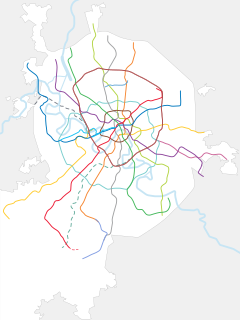VDNKh ВДНХ | |||||||||||
|---|---|---|---|---|---|---|---|---|---|---|---|
| Moscow Metro station | |||||||||||
 | |||||||||||
| General information | |||||||||||
| Location | Ostankinsky District North-Eastern Administrative Okrug Moscow Russia | ||||||||||
| Coordinates | 55°49′16″N 37°38′28″E / 55.8211°N 37.6411°E | ||||||||||
| Owned by | Moskovsky Metropoliten | ||||||||||
| Line(s) | |||||||||||
| Platforms | 1 island platform | ||||||||||
| Tracks | 2 | ||||||||||
| Connections | Monorail: Bus: м9, 15, 33, 56, 76, 85, 93, 136, 154, 172, 195, 244, 286, 375, 378, 379, 533, 544, 803, 834, 903, т13, т14, т76 Tram: 11, 17, 25 | ||||||||||
| Construction | |||||||||||
| Depth | 53.5 metres (176 ft) (deepest from Kaluzhsko-Rizhskaya Line) | ||||||||||
| Platform levels | 1 | ||||||||||
| Parking | No | ||||||||||
| Other information | |||||||||||
| Station code | 090, VS | ||||||||||
| History | |||||||||||
| Opened | 1 May 1958 | ||||||||||
| Previous names | VSKhV (1958—1959) | ||||||||||
| Services | |||||||||||
| |||||||||||
| |||||||||||
VDNKh (Russian: ВДНХ) is a Moscow Metro station in Ostankinsky District, North-Eastern Administrative Okrug, Moscow, Russia. It is located on the Kaluzhsko-Rizhskaya Line, between Alekseyevskaya and Botanichesky Sad stations. VDNKh was opened on 1 May 1958. The name stands for Exhibition of Achievements of the National Economy Vystavka Dostizheniy Narodnovo Khozyaystva (abbreviated VDNKh).
VDNKh is one of the deepest Metro stations being situated 53.5 metres (176 ft) below ground. It is also one of the busiest stations, serving 107,377 passengers a day in 2009.[1]
Originally, this station was planned to be opulently decorated in the manner of the other stations built in the 1950s, with mosaics by venerable artist Vladimir Favorsky along the insides of the arches between the pylons. However, in the wake of Nikita Khrushchev's attack on decorative "excessions", the place for mosaics, including existing mosaics as well, were crudely coated with incongruous thick green paint.
It was the deepest station in Moscow Metro from 1958 until 1979.
- ^ Пассажиропотоки 2009 год. Олимп (in Russian). Archived from the original on 28 September 2010. Retrieved 18 June 2010.
